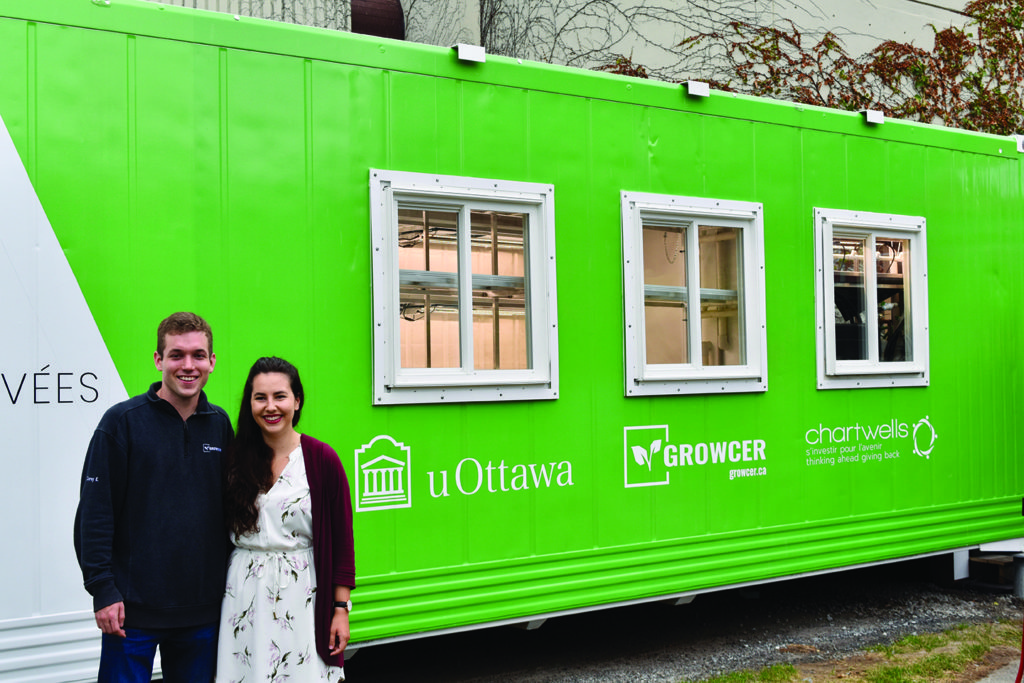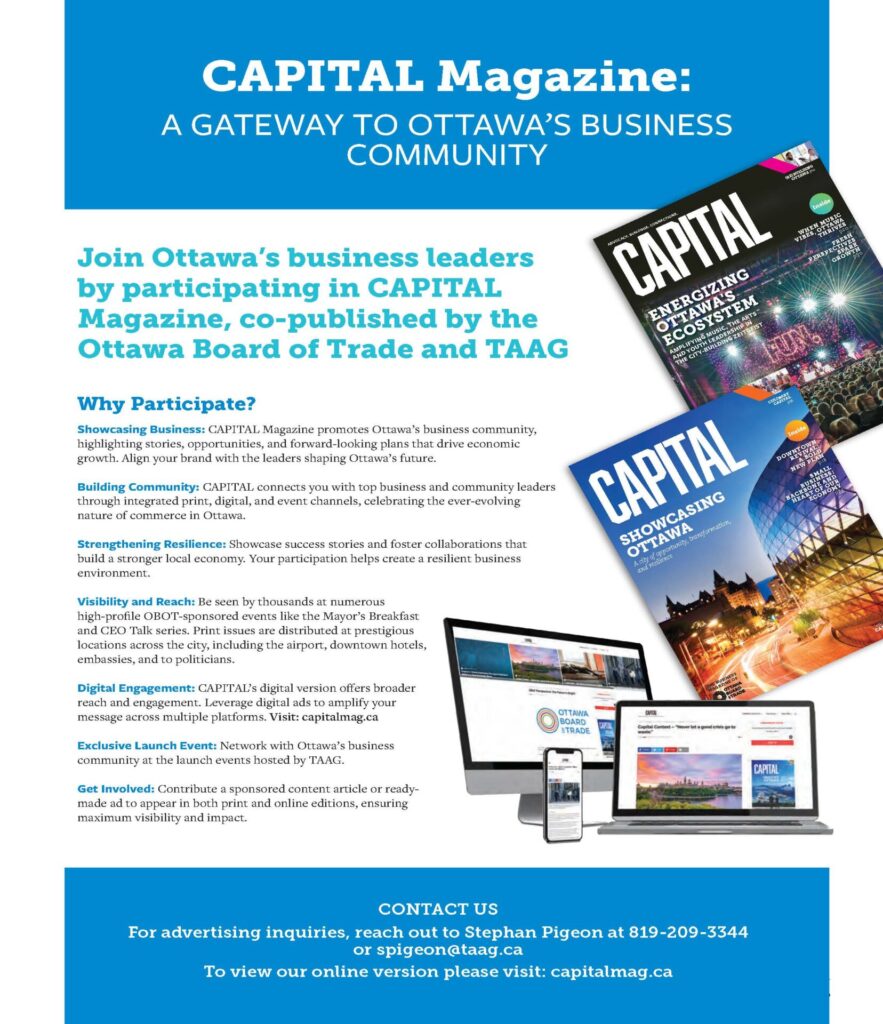Feature – NCR Small Businesses Expanding, Gaining Canadian, Global Presence

Friendly, the Giant Tiger
Many successful small businesses rooted to the National Capital Region have grown in size and are now punching above their weight on the national and international stage.
By Jeff Buckstein
GIANT TIGER STORES is a prime example. The iconic retailer opened its first store in the ByWard Market in 1961. Today, there are 16 local outlets, and 500 employees at the corporate head office, amongst more than 245 retail locations, and about 8,500 employees across Canada, with plans to open another 15 to 18 stores a year nationwide over the next few years.
“We see a pretty aggressive growth path. Our customers like what Giant Tiger has to offer, and so we keep opening stores to deliver that. That’s creating more great careers for people that want to join the Giant Tiger team—and we’re happy to offer those,” emphasizes senior vice-president of human resources Ron Hyson.
“Giant Tiger has been very successful over the 57 years that we’ve been in business. We have many stories of people with 25, 30, 40, 45 years [of service], that have been with Giant Tiger that we’re quite proud of,” Hyson adds.
Management is also looking to the future, and how to stay on top of an unprecedented rate of change in the industry as it expands and tries to appeal to more consumers.
“The focus of the company has always been steadfastly on doing the right thing for our customers and in our communities. About six years ago we underwent a very significant project called our New Store Experience. We took a look at the overall journey and path of the consumer in our stores, and they went through a refresh,” says Alison Scarlett, Giant Tiger’s director of brand communications.
Under the New Store Experience campaign, stores were redesigned to provide more bright and cheery décor, with aisles that were easier to navigate, and more clearly defined departments.
“We have defined the areas of the store to create an easy shopping experience for our customers. As an example, we created ‘houses’ within the store for fashion, but within the houses, we have made them occasion-based, dressy, casual, athleisure,” Scarlett elaborates.
Hyson offers this advice for NCR-based companies seeking external growth: first, look inward, and determine what made you successful in your home base.
“For us, it’s always been about people driving the success of Giant Tiger through attracting the right talent to grow the business. The key to attracting the right talent has always been about having the right culture, where people want to come, and stay, and continue to grow their careers here,” says Hyson.
The Pythian Group, Inc. is only a generation old, but it has already made its mark on the global stage.
Ottawa-based Pythian, a global IT product and services company that helps businesses adopt innovative data and cloud technologies to help them compete in a changing, competitive marketplace, currently has 450 employees worldwide, and a presence in over 30 countries and 150 cities.
“We realized if we wanted to have a really, truly elite team, we needed to establish ourselves overseas,” says Paul Vallée, Pythian’s co-founder, president, and chief executive officer.
“Essentially we believe that data is the most valuable resource on the planet. We’re helping our customers keep it available, make it secure, help with their systems performance and bring their applications to market faster. We’re also helping them unlock the opportunity that their data represents by applying more advanced analytics capabilities,” Vallée explains.
About 150 employees, or one-third of Pythian’s global workforce, is situated in the firm’s head office here.
“Ottawa is a phenomenal place to host a head office for a business. We have access to very educated talent that is confident playing on the international stage. Even our headquarters is a very well functioning and well-gelled United Nations of people from all over the world,” says Vallée.
This cultural diversity is very positive for both the brand of Pythian as well as for Ottawa/Canada because it gives the company a head start both in terms of being able to attract talent from all over the world and in understanding how other countries work when dealing internationally, he elaborates.
“As we invent these technologies, and continue to develop them, more and more work will be able to be delivered over the Internet,” Vallée predicts. “That means more and more work is going to be consumed globally by people who are ultimately not sharing a whole lot of homogeneous characteristics.”
Ottawa is also attractive because we are recognized on the international stage for having a stable government with low corruption, a mature judicial system, and a reliable power and Internet infrastructure.
“You don’t need to work globally very much to realize that these things matter a ton,” Vallée stresses.
Dymon Storage Corporation’s local roots trace back to 1995 in commercial real estate development and assisted-living retirement homes, but the company is now focused entirely on storage.
It currently has about 1.3 million square feet of storage space for its residential and commercial customers in eight facilities across Ottawa, with another four buildings currently under construction, that are expected to be completed in 2019 and 2020. These facilities range in size from about 125,000 to 250,000 square feet.
“Our facilities are large, so we get great economies of scale, and because of that we can pass on those savings to the guest,” says senior vice-president Steve Creighton.
There are also plans to open up to 80 new sites in Toronto over the next seven to ten years.
“Ottawa has provided us a great incubator,” says Creighton, who notes that facilities have generally only taken between five and 12 months to fill. “Ottawa has given us an incredible opportunity to take hold of the market, and to refine our service offering, and be positioned as we start our expansion into the greater Toronto area,” he adds.
“The Greater Toronto area is an unbelievable opportunity for us. The population is growing at a very fast pace, and a vast majority of new immigrants into Canada end up in the GTA,” notes Creighton.
Furthermore, with the cost of real estate in the Toronto area, people can now only afford to buy homes or condos that are getting smaller, and so it is harder to fit everything into a home, he elaborates.
Despite ambitious expansion plans to Canada’s largest city, Dymon’s corporate head office will remain here. “We’re not going to forget where our roots are. We’ve done very well here, and we’re very proud to say that we started off in Ottawa,” says Creighton.
Ottawa Start-Up Helping Remote Northern Areas Grow Food
When University of Ottawa students Corey Ellis and Alida Burke traveled to Iqaluit with a student group called Enactus uOttawa to facilitate a series of entrepreneurship workshops, they discovered that hunger was a very serious problem in the territory’s fly-in communities, caused by food shortages and exorbitantly high prices.
“Visiting Iqaluit for the first time in 2015 was a notable experience, as Corey and I had never been exposed to the challenges of food insecurity before,” recalls Burke. “Hearing about peoples’ experiences, as well as seeing the high prices and low-quality firsthand for basic food items, really put it into perspective and drove us to want to do something about it,” she says.
Ellis, 23, and Burke, 22 responded to the challenge by co-founding The Growcer Inc. The business manufactures a hydroponic system that utilizes three ingredients essential for plants to grow well – carbon dioxide in the air, nutrient-rich water over the roots, and light. Much of that system is automated by a computer, and can even be used by people with no agricultural experience.
“When you put those things in [in] the right amounts, and you control the environment within tight parameters, you’re able to optimize the growing speed of plants,” says Ellis, The Growcer’s chief executive officer, who recently graduated with a Bachelor of Commerce degree.
“Think of it a bit like an IV. We’re basically giving an IV to plants. We’re bringing nutrients to plants so it doesn’t have to work so hard to put out roots. It’s getting everything it needs, and right away can put out leaves a lot faster than it would grow in soil,” he elaborates.
The Growcer focuses on high yield, rapid growth plants. Some of the popular produce types include lettuce, bok choy, spinach, arugula, kale, and herbs like basil, cilantro, dill, and rosemary. Other produce includes brassicas like broccoli and peppers.
The Growcer commenced operations in June 2016 with assistance from the University of Ottawa’s Startup Garage, an initiative to support student entrepreneurs, which provided both mentorship and financial assistance. The Business Development Bank of Canada and Futurpreneur also provided start-up financing.
The fully-built hydroponic system, which is 40 feet long, nine and a half feet tall, and eight feet wide, plus all of the automation equipment and hydroponic supplies, costs $180,000, plus shipping and installation. It is a modular ‘plug-and-play’ unit. Additional units can be subsequently purchased and plugged into the existing unit(s).
“When the system arrives, it’s literally a matter of a day or two to unpack everything, inventory, plug it in, fill up the water tank with a garden hose, and you’ve got a commercial farm,” says Ellis.
“We have a great support system here in Ottawa, from advisors to partners, which has helped us start and grow our company,” says Burke, the chief operating officer. She cites, for example, the contribution of Invest Ottawa, whose Accelerator Program The Growcer is participating in, noting that “we wouldn’t be where we are today without them.”
Burke recalls the pride she felt when Prime Minister Justin Trudeau toured the hydroponic facility at Invest Ottawa’s Bayview Yards location last spring. “It was great to have Prime Minister Trudeau tour our system and to see his interest in our work. It really puts in perspective the support we’ve received from Invest Ottawa as well as [from] all levels of government,” she says.
Another positive factor has been access to excellent talent in the National Capital Region.
“People want to join who have a ton of experience in areas that really align with our business, whether that be sustainable agriculture or working in an Indigenous context, [or] engineering. There’s a huge pool of candidates out there for the roles we’re looking to fill,” Ellis says.
So far, sales have been exclusively within Canada, to Churchill, Manitoba, to Kugluktuk, Nunavut, and to Kuujjuaqin northern Quebec.
“We’re looking for new markets to export to. We’re looking at northern Europe as one of the first places—similar climate, similar challenges. Our systems are well-designed for environments where water use is a challenge,” says Ellis.
The Growcer is aiming to export to Europe in early 2019.

























